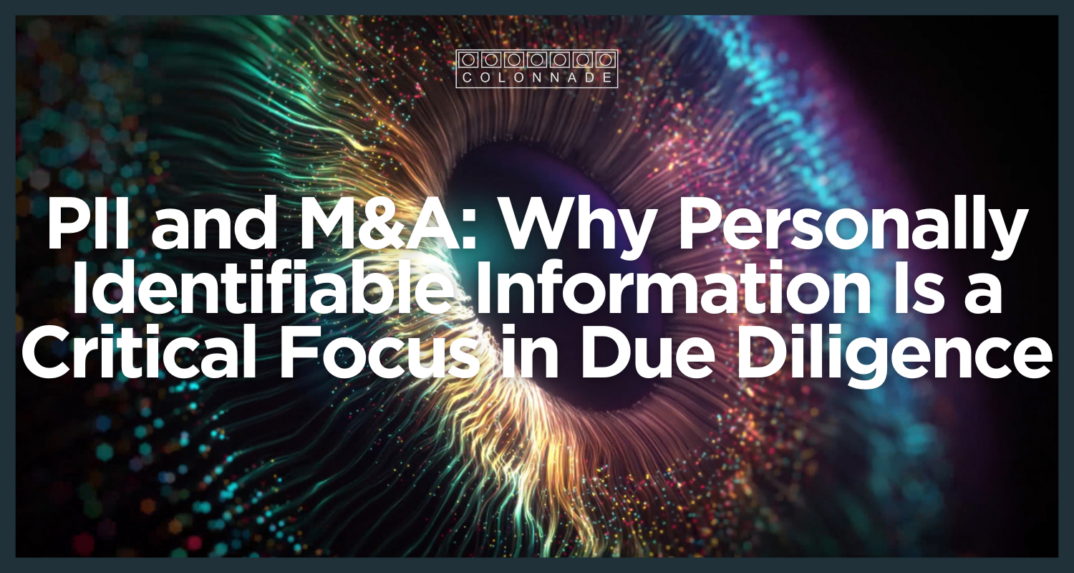PII and M&A: Why Personally Identifiable Information Is a Critical Focus in Due Diligence

In the age of data-driven businesses, few diligence topics raise red flags faster than poor handling of PII—Personally Identifiable Information.
If your company collects, stores, or processes personal data, it’s essential to understand what PII is, how it’s regulated, and what acquirers will expect during diligence. Mishandled PII can lead to lawsuits, regulatory penalties, and—in the worst cases—deal termination.
This post defines PII in plain terms and outlines the key diligence areas buyers review to assess data privacy, security, and compliance readiness.
🔍 What Is PII?
PII stands for Personally Identifiable Information—any data that can be used to identify, locate, or contact an individual, either on its own or when combined with other information. Some of the items considered PII may be surprising to you.
Common Types of PII:
Direct Identifiers:
- Full name
- Social Security Number (SSN)
- Driver’s license or passport number
- Vehicle identification number (VIN)
Contact Information:
- Home address
- Email address
- Phone number
Financial Data:
- Bank account numbers
- Credit card details
- Tax ID numbers
Health Information:
- Medical records
- Insurance information (covered by HIPAA in the U.S.)
Online Identifiers:
- IP addresses
- Login credentials
- Biometric data (fingerprints, facial scans, etc.)
PII is regulated globally under frameworks like GDPR (EU), CCPA (California), GLBA (financial institutions), and HIPAA (healthcare). In a deal, mishandling of PII can expose both buyer and seller to post-close liabilities.
🔐 Why PII Is a Key Part of M&A Diligence
Buyers assess a target’s handling of PII to:
- Ensure compliance with data privacy regulations
- Evaluate cyber risk and potential for breach liability
- Understand how PII is secured, stored, and shared
- Confirm customer consent and opt-out mechanisms
- Identify technical debt and systems at risk
This is especially relevant for:
- SaaS companies with customer data
- Consumer-facing businesses
- Financial services and healthcare firms
- Any organization handling credit card payments or personal data in the cloud
🗂️ What Buyers Review During PII Diligence
A thorough buyer will request the following documentation to assess how your organization handles PII:
1. Data Inventory & Classification
- Data Mapping & Inventory Reports – Where PII is stored (on-prem, cloud, vendors)
Data Classification Policies – Defines what data is sensitive, confidential, or public
2. Access Control & Data Governance
- Role-Based Access Control (RBAC) – Who has access to what data and why
- PII Access Logs – Tracks access to sensitive data
- Consent Management Records – Proof of how customer consent is obtained and honored
- Data Retention & Destruction Policies – How long PII is stored and how it’s deleted
3. Security Practices
- Encryption Policies – How PII is protected in transit and at rest
- Data Masking or Tokenization – Replacing sensitive data with hashed or anonymized versions
- Data Loss Prevention (DLP) Reports – Logs of attempts to extract or misuse data
- Static & Dynamic Code Scans – If PII is embedded in software or platforms
4. Incident Response & Risk Assessments
- Breach Notification Templates – Pre-approved language for regulator and user notification
- Ransomware Impact Reports – Impact of cyberattacks on PII
- Insider Threat Monitoring Reports – Risks from internal users
- Third-Party Data Sharing Agreements – Contracts with vendors handling PII
5. Regulatory Compliance
- GDPR/CCPA/DPIA Reports – Privacy impact assessments and consumer data request logs
- PCI-DSS Compliance – For businesses processing credit card information
- GLBA Compliance – For financial services
- Cross-Border Transfer Documentation – Policies for international data flow
📌 Buyers want to understand how you protect PII and whether your practices meet modern compliance standards—especially when data spans multiple jurisdictions.
🧨 Common Red Flags in PII Diligence
- No data inventory or mapping
- Missing consent documentation
- Inconsistent access control policies
- Use of plaintext PII (no encryption or masking)
- Lack of third-party vetting for vendors with PII access
- No evidence of breach response planning
- Unfulfilled data deletion or subject access requests (GDPR/CCPA)
Final Thoughts: Be Proactive with PII
If your company touches sensitive data, PII should be a first-class citizen in your due diligence preparation. Strong data governance not only protects your customers—it protects the value of your business.
By organizing your documentation around data access, consent, breach response, and encryption, you’ll give buyers the confidence they need to move forward—and reduce the risk of post-close surprises.
📩 Need help getting your data governance ready for diligence? Colonnade Advisors can help you prepare a clean, defensible set of materials that support both compliance and enterprise value. Let’s talk!


